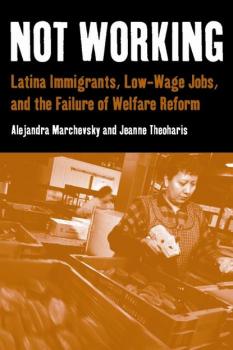ТОП просматриваемых книг сайта:
Jeanne Theoharis
Список книг автора Jeanne TheoharisАннотация
Not Working chronicles the devastating effects of the 1996 welfare reform legislation that ended welfare as we know it. For those who now receive public assistance, “work” means pleading with supervisors for full-time hours, juggling ever-changing work schedules, and shuffling between dead-end jobs that leave one physically and psychically exhausted.Through vivid story-telling and pointed analysis, Not Working profiles the day-to-day struggles of Mexican immigrant women in the Los Angeles area, showing the increased vulnerability they face in the welfare office and labor market. The new “work first” policies now enacted impose time limits and mandate work requirements for those receiving public assistance, yet fail to offer real job training or needed childcare options, ultimately causing many families to fall deeper below the poverty line. Not Working shows that the new “welfare-to-work” regime has produced tremendous instability and insecurity for these women and their children. Moreover, the authors argue that the new politics of welfare enable greater infringements of rights and liberty for many of America's most vulnerable and constitute a crucial component of the broader assault on American citizenship. In short, the new welfare is not working.
Аннотация
Shares the voices of students speaking out against the failures of urban education "Our schools suck." This is how many young people of color call attention to the kind of public education they are receiving. In cities across the nation, many students are trapped in under-funded, mismanaged and unsafe schools. Yet, a number of scholars and of public figures have shifted attention away from the persistence of school segregation to lambaste the values of young people themselves. Our Schools Suck forcefully challenges this assertion by giving voice to the compelling stories of African American and Latino students who attend under-resourced inner-city schools, where guidance counselors and AP classes are limited and security guards and metal detectors are plentiful—and grow disheartened by a public conversation that continually casts them as the problem with urban schools.By showing that young people are deeply committed to education but often critical of the kind of education they are receiving, this book highlights the dishonesty of public claims that they do not value education. Ultimately, these powerful student voices remind us of the ways we have shirked our public responsibility to create excellent schools. True school reform requires no less than a new civil rights movement, where adults join with young people to ensure an equal education for each and every student.


